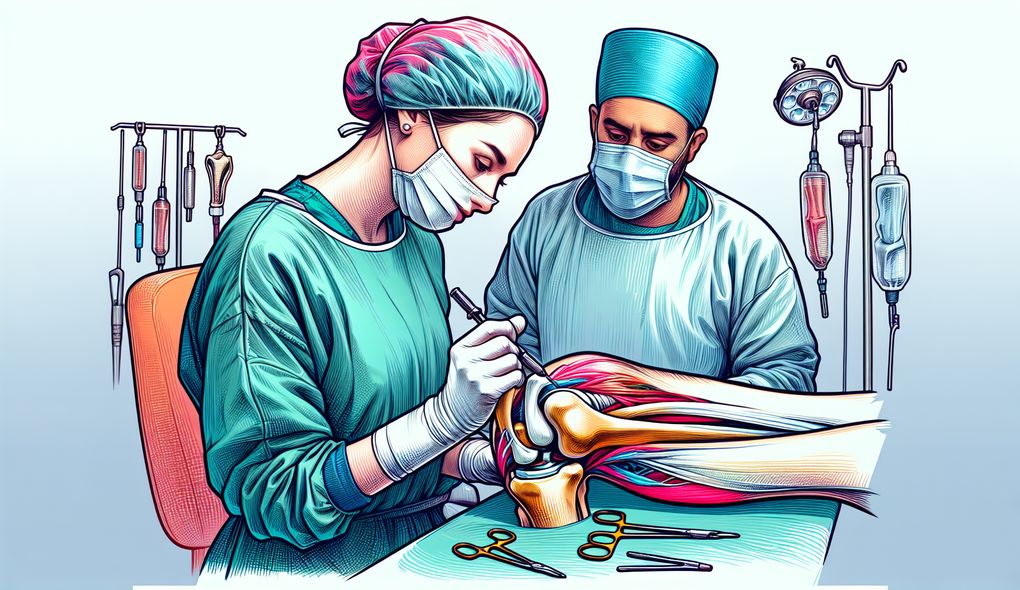What measures do you take to ensure patient safety during joint replacement procedures?
INTERMEDIATE LEVEL

Sample answer to the question:
During joint replacement procedures, I take several measures to ensure patient safety. First, I thoroughly review the patient's medical history and perform a comprehensive physical examination to assess their overall health. I also order necessary preoperative tests, such as blood work and imaging, to identify any potential risks. In the operating room, I strictly adhere to sterile techniques and infection control protocols to minimize the risk of surgical site infections. Additionally, I use advanced surgical technologies and equipment to enhance precision and minimize complications. After the procedure, I closely monitor the patient's vital signs and provide appropriate pain management to ensure their comfort and stability. Regular follow-up appointments are scheduled to monitor the healing process and address any concerns. In summary, my focus is on thorough preoperative evaluation, meticulous surgical technique, and attentive postoperative care to ensure the safety and well-being of my patients.
Here is a more solid answer:
Ensuring patient safety during joint replacement procedures is of utmost importance to me. I combine my expertise in total joint arthroplasty procedures with strong decision-making and problem-solving skills to make informed choices throughout the surgical process. I actively stay updated on modern surgical technologies and equipment, utilizing them to enhance precision and reduce risks. Effective communication and interpersonal abilities play a vital role in coordinating with the multidisciplinary team to provide comprehensive patient care. I thrive in fast-paced environments, maintaining composure under pressure and performing at my best. Finally, my commitment to continuous professional development ensures I stay abreast of advancements in joint replacement techniques, enabling me to deliver the highest quality care to my patients.
Why is this a more solid answer?
The solid answer provides specific details regarding the candidate's expertise, decision-making skills, proficiency in using modern surgical technologies, communication and interpersonal abilities, ability to work under pressure, and commitment to continuous professional development. It establishes a clear connection between the candidate's skills and the measures taken to ensure patient safety.
An example of a exceptional answer:
Patient safety is my top priority during joint replacement procedures, and I leave no stone unturned to achieve it. Before surgery, I conduct a comprehensive preoperative assessment, considering the patient's medical history, lifestyle factors, and potential risks. I collaborate closely with other specialists, such as anesthesiologists and nurses, to develop an individualized plan of care. In the operating room, I strictly adhere to evidence-based surgical protocols, including the use of prophylactic antibiotics and deep vein thrombosis prophylaxis. I am meticulous in my surgical technique, ensuring accurate implant positioning and stability. Postoperatively, I implement strict infection control measures, employ multimodal pain management strategies, and establish clear communication channels with the patient for ongoing monitoring. Furthermore, I actively participate in research and quality improvement initiatives to continuously enhance patient safety and outcomes.
Why is this an exceptional answer?
The exceptional answer provides a comprehensive approach to patient safety during joint replacement procedures. It includes specific details about the preoperative assessment, collaboration with other specialists, adherence to evidence-based protocols, meticulous surgical technique, postoperative care, and participation in research and quality improvement initiatives. The answer demonstrates the candidate's commitment to excellence in patient care.
How to prepare for this question:
- Familiarize yourself with evidence-based surgical protocols and infection control measures.
- Stay updated on the latest advancements in joint replacement techniques.
- Develop strong decision-making and problem-solving skills through case discussions and clinical scenarios.
- Practice effective communication and interdisciplinary collaboration.
- Enhance your knowledge of multimodal pain management strategies.
- Showcase your commitment to continuous professional development through recent courses, certifications, or research involvement.
What are interviewers evaluating with this question?
- Expertise in total joint arthroplasty procedures
- Strong decision-making and problem-solving skills
- Proficient in using modern surgical technologies and equipment
- Excellent communication and interpersonal abilities
- Ability to work under pressure in fast-paced environments
- Commitment to continuous professional development

